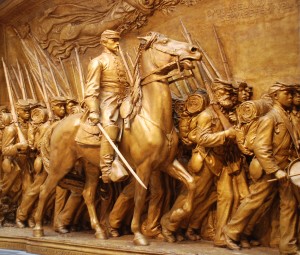
Courage is a virtue often desired yet one that is hard to put into practice. Why is this so? In some cases, it is due to danger that we find ourselves in. In other instances, we find ourselves in no immediate physical danger but instead face the extreme displeasure or disapproval of general society. It takes real courage to take an unpopular stance on a controversial topic. It takes real courage to stand apart from the majority as much as it takes courage to stand in the face of gunfire on the battlefield.
In this installment of the “Profiles of Great Americans” series, I want to introduce you to an American histoical figure who provides an excellent example of courage in the face of both physcial danger and social pressure: Robert Gould Shaw. Shaw was born in 1837 in Boston to Francis and Sarah Shaw, prominent New England abolitionists. Raised in such a family, Shaw grew up hating slavery and believing that “all men are created equal”. Despite a general consensus in the North that slavery should end, many Northerners still regarded African-Americans as second-rate humans, even sub-human. When the Civil War broke out, many Northerners were opposed to African-Americans fighting in the Union army. Shaw was among the minority who supported putting freemen in combat roles. In fact, he was willing to take the responsibility to lead Massachusett’s first African-American unit: the 54th Massachusetts Infantry.
Many in the North and South despised Shaw for his leadership and his conviction in the equality of all men. At first, Shaw turned down the offer to command the 54th but he knew what the right thing to do was and he did it. It took incredible courage to face the disapproval of his own society for following what he believed was right.
Furthermore, Shaw had courage to face the physical danger of battle. His unit participated in the battle of Fort Wagner in Charleston harbor in South Carolina in 1863. It was during the assault on Fort Wagner that Shaw uttered the famous rallying charge to his troops, “Forward, 54th! Forward!” Shaw was one of the many casaulties of the attack. He was unceremoniously buried with his troops in a mass grave by the Confederate defenders of Fort Wagner. Francis Shaw, Robert’s father, declared that there was “no holier place” that he wished his son would be buried in.
Robert Gould Shaw was a tremendous example of courage and self-sacrifice. As the line from the Battle Hymn of the Republic goes, “Christ died to make men holy, now we die to make men free.” Robert Gould Shaw died a death of noble sacrifice for his brothers. He endured death and social disapproval for that which he beleived was right and true. We can all follow his example.
